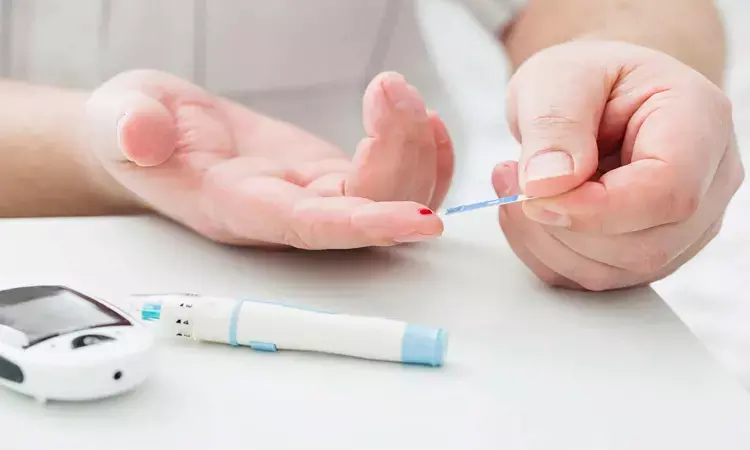- Home
- Medical news & Guidelines
- Anesthesiology
- Cardiology and CTVS
- Critical Care
- Dentistry
- Dermatology
- Diabetes and Endocrinology
- ENT
- Gastroenterology
- Medicine
- Nephrology
- Neurology
- Obstretics-Gynaecology
- Oncology
- Ophthalmology
- Orthopaedics
- Pediatrics-Neonatology
- Psychiatry
- Pulmonology
- Radiology
- Surgery
- Urology
- Laboratory Medicine
- Diet
- Nursing
- Paramedical
- Physiotherapy
- Health news
- Fact Check
- Bone Health Fact Check
- Brain Health Fact Check
- Cancer Related Fact Check
- Child Care Fact Check
- Dental and oral health fact check
- Diabetes and metabolic health fact check
- Diet and Nutrition Fact Check
- Eye and ENT Care Fact Check
- Fitness fact check
- Gut health fact check
- Heart health fact check
- Kidney health fact check
- Medical education fact check
- Men's health fact check
- Respiratory fact check
- Skin and hair care fact check
- Vaccine and Immunization fact check
- Women's health fact check
- AYUSH
- State News
- Andaman and Nicobar Islands
- Andhra Pradesh
- Arunachal Pradesh
- Assam
- Bihar
- Chandigarh
- Chattisgarh
- Dadra and Nagar Haveli
- Daman and Diu
- Delhi
- Goa
- Gujarat
- Haryana
- Himachal Pradesh
- Jammu & Kashmir
- Jharkhand
- Karnataka
- Kerala
- Ladakh
- Lakshadweep
- Madhya Pradesh
- Maharashtra
- Manipur
- Meghalaya
- Mizoram
- Nagaland
- Odisha
- Puducherry
- Punjab
- Rajasthan
- Sikkim
- Tamil Nadu
- Telangana
- Tripura
- Uttar Pradesh
- Uttrakhand
- West Bengal
- Medical Education
- Industry
History of long, irregular menstrual cycles tied to increased risk of diabetes: JAMA

USA: Women who had long and irregular menstrual cycles throughout life are at higher risk of type 2 diabetes (T2D), finds a recent study in the journal JAMA Network Open. This was particularly seen in women with low levels of physical activity, a low-quality diet, and obesity or overweight.
Dysfunction in menstrual cycle is associated with insulin resistance -- a key factor for the development of type 2 diabetes. However, there is scarce and inconsistent evidence linking irregular and long menstrual cycle with T2D. To fill this knowledge gap, Yi-Xin Wang, Harvard T.H. Chan School of Public Health, Boston, Massachusetts, and colleagues aimed to evaluate the associations between menstrual cycle characteristics at different points throughout a woman's reproductive life span and T2D risk and the extent to which this association is modified by lifestyle factors.
For the purpose, the researchers performed a prospective cohort study including 75 546 premenopausal US female nurses who participated in the Nurses' Health Study II from 1993 to June 30, 2017. Data analysis was performed from February 1 to December 30, 2019. The researchers identified self-reported usual length and regularity of menstrual cycles at the age ranges of 14 to 17 years, 18 to 22 years, and 29 to 46 years.
Main outcome was incident type 2 diabetes identified through self-report and confirmed by validated supplemental questionnaires.
Key findings of the study include:
- A total of 5608 participants (7.4%) had documented new cases of type 2 diabetes during 1 639 485 person-years of follow-up.
- After adjustment for potential confounders, women reporting always having irregular menstrual cycles between the age ranges of 14 to 17 years, 18 to 22 years, and 29 to 46 years were, respectively, 32%, 41%, and 66% more likely to develop type 2 diabetes than women reporting very regular cycles (within 3-4 days of expected period) in the same age range.
- Similarly, women reporting a usual cycle length of 40 days or more between the age ranges of 18 to 22 years and 29 to 46 years were, respectively, 37% and 50% more likely to develop type2 diabetes during follow-up compared with women reporting a usual cycle length of 26 to 31 days in the same age ranges.
- These associations appeared to be stronger among women with overweight or obesity, a low-quality diet, and low levels of physical activity.
- The relative excess risk of type 2 diabetes due to the interaction between irregular and long menstrual cycles and the overall unhealthy lifestyle score was 0.73 and 0.68, respectively.
"In this cohort study of US female nurses participating in the Nurses' Health Study II, irregular and long menstrual cycles throughout life were associated with a greater long-term risk of type 2 diabetes, particularly among women who adopted unhealthy lifestyles," wrote the authors.
"These results highlight the need for considering characteristics of menstrual cycle across the reproductive life span as an independent sign for evaluating the metabolic risk of the patients and point to potential lifestyle interventions for T2D prevention in women with menstrual cycle dysfunction," they concluded.
The study titled, "Associations of Menstrual Cycle Characteristics Across the Reproductive Life Span and Lifestyle Factors With Risk of Type 2 Diabetes," is published in the journal JAMA Network Open.
DOI: https://jamanetwork.com/journals/jamanetworkopen/fullarticle/2774351
Dr Kamal Kant Kohli-MBBS, DTCD- a chest specialist with more than 30 years of practice and a flair for writing clinical articles, Dr Kamal Kant Kohli joined Medical Dialogues as a Chief Editor of Medical News. Besides writing articles, as an editor, he proofreads and verifies all the medical content published on Medical Dialogues including those coming from journals, studies,medical conferences,guidelines etc. Email: drkohli@medicaldialogues.in. Contact no. 011-43720751


